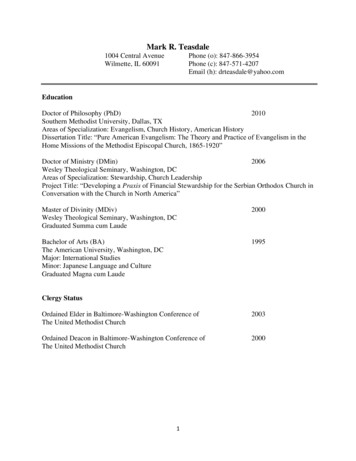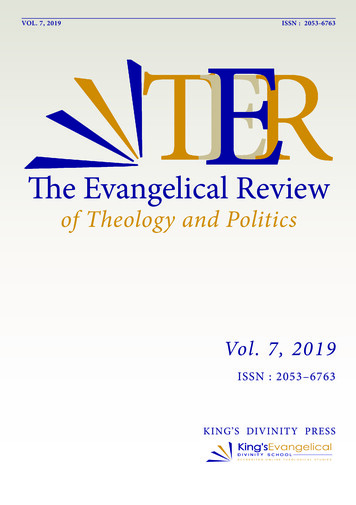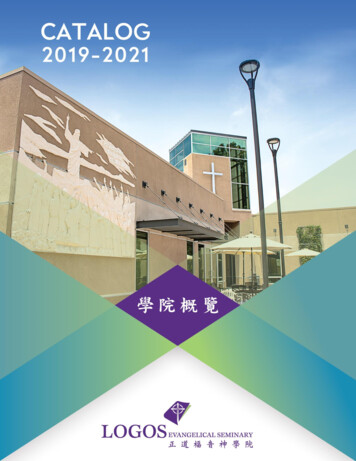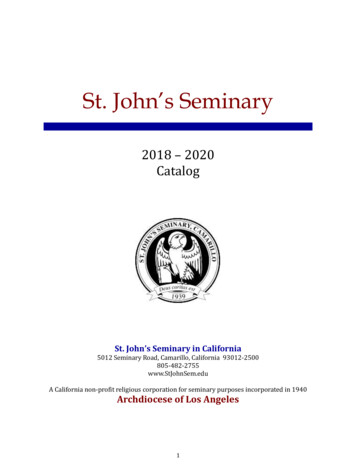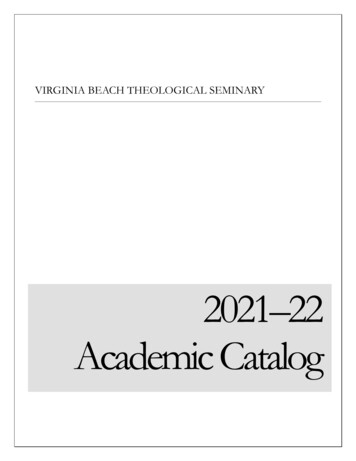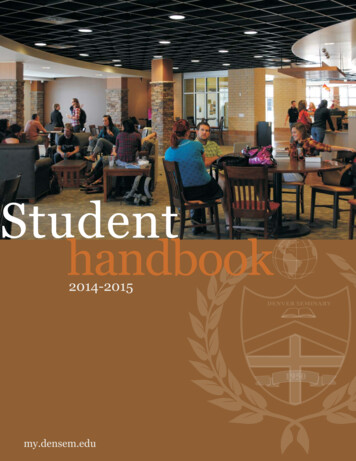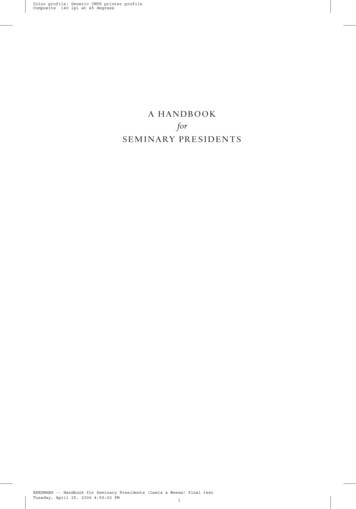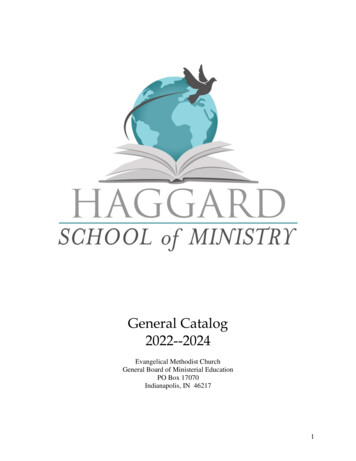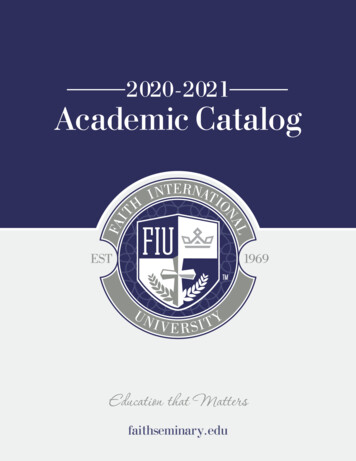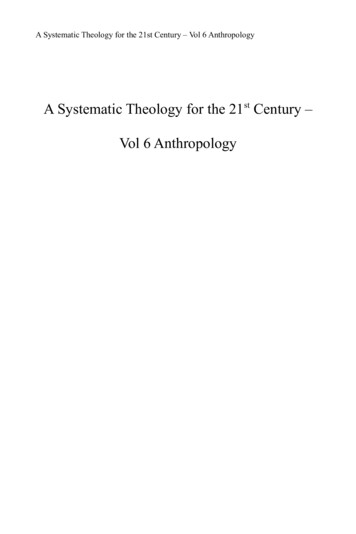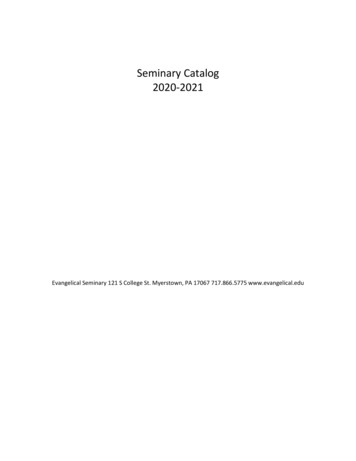
Transcription
Seminary Catalog2020-2021Evangelical Seminary 121 S College St. Myerstown, PA 17067 717.866.5775 www.evangelical.edu
Accreditation and AffiliationsEvangelical is accredited by the Commission on Accrediting of the Association of Theological Schools in the UnitedStates and Canada (ATS), 10 Summit Park Drive, Pittsburgh, PA 15275 (Phone 412.788.6505, Fax: 412-788-6510,Website: www.ats.edu). The seminary is approved to offer the Master of Divinity, the Master of Arts (Religion) (alltracks), the Master of Arts in Marriage and Family Therapy, the Master of Arts in Leadership Development, theMaster of Arts in Spiritual Formation and Direction, the Master of Arts in Ministry, the Master of Arts (Bible) and theDoctor of Theology degree programs, as well as the Certificate in Ministry and Graduate Certificates.Evangelical’s Master of Arts in Marriage and Family Therapy is accredited by the Commission on Accreditation forMarriage and Family Therapy Education (COAMFTE), 112 South Alfred Street, Alexandria, VA 22314, (703) 8389808, coa@aamft.org.Evangelical is approved by the US Department of Justice and the US Department of Homeland Security for theenrollment of non-immigrant, international students.Evangelical is approved by a variety of denominations (e.g., the Evangelical Congregational Church, the UnitedMethodist Church, the Wesleyan Church, several churches within the Brethren tradition, and others) for trainingindividuals for ordained ministry. Over the years, students representing more than forty denominations haveenrolled at Evangelical.Non-Discrimination PolicyEvangelical Seminary admits women and men of any race, color, nationality or ethnic origin to all the rights,privileges, programs and activities available at the seminary. Evangelical Seminary does not discriminate on the basisof gender, race, color, nationality or ethnic origin, age, relationship status, socioeconomic status, disability, healthstatus, or religious and spiritual beliefs in the administration of its educational policies, financial aid or other schooladministered programs.Family Education Rights and Privacy Act of 1974In accordance with federal law, students are hereby notified that they have the right to inspect and review any andall official records, files and data including all material incorporated in their cumulative record.Students may request a hearing to challenge the contents of these records to ensure that they are accurate and notin violation of any of their rights. Students also have the opportunity to request correction, amendment orsupplementation of any such records. These requests should be made with the Director of Academic Services.The only information that will be released concerning a student will be directory information as defined in the act,unless the student has specifically waived those rights in writing. Students with questions concerning their rightswithin the act may consult with the Director of Academic Services.Notification of ChangeNotice is hereby given that policies and descriptions contained in this catalog are subject to change without notice.Policies and details not covered in this catalog are described in the Student Handbook which is provided to creditstudents upon enrollment, and is available upon request from the main office. Students can access the coursecatalog and Student Handbook on Populi the Seminary’s Management software.2
Table of ContentsAcademic Calendar4About the Seminary5Campus Facilities9Pense Learning Center9Institute for Church Leadership10Student Life12Admission to Graduate Study14Financial Assistance and Information17Graduate Schools and Academic Programs23Graduate School of Bible, Theology, and Ministry24Master of Divinity25Master of Arts (Religion)32Master of Arts in Ministry37Master of Arts (Bible)38Grad Certificate in Lay Ministry39Doctor of Theology40Graduate School of Marriage and Family Studies45Master of Arts in Marriage and Family Therapy46Grad Certificate in Marriage and Family Counseling53Graduate School of Leadership and Formation54Master of Arts in Leadership Development55Master of Arts in Spiritual Formation and Direction57Grad Certificate in Spiritual Direction61Non-Credit Certificate in Spiritual Direction61Grad Certificate in Directing the Spiritual Exercises65Academic Policies68Seminary Personnel76Seminary Trustees77Seminary Faculty78Course Descriptions81Index1053
2020-2021 Academic CalendarSummer 2020 Session:May 13-Aug 18May 26—Aug. 25May 26—July 27June 2—August 3August 18—October 19May 26—June 30May 13-Aug 25ThD Courses (Reading Week July 1-7)ThD residencies June 4 (Cohort 1) and June 2-4 (Cohort 2)Biblical Languages CoursesMAL Module 9 (Residency June 5-7)MASFD Module 6 (Residency (June 12-14)MAL Module 10 (Residency August 28-30)All other master’s level courses (Thursday classes finish July 2)Fall 2020 Session:Sept 1—Nov 2Sept 2-- Dec 8August 27 – December 10MASFD Module 7 (Residency Sept 11-13)ThD Courses (Reading Week Oct 21-27)ThD residencies September 17 (Cohort 1), September 15-17 (Cohort 2), andSeptember 17-19 (Cohort 3)August 27—Dec 14All semester-length master’s level coursesStart dates: Th, August 27, Tu, September 1, Mo, September 14(Reading Week October 19-22)Nov 10 – Jan 18MASFD Module 8 (Residency Nov. 20-22)Important Dates This Term:Sept. 7Labor Day Holiday (offices closed)Sept. 8Fall Convocation (7:00 p.m.)Sept. 17Last day to add/drop courses (semester-length courses only)Oct. 19-Nov. 23 Winter/Spring Registration PeriodNov. 26-27Thanksgiving Holiday (offices closed) (Th/F)Dec. 23 - Jan. 1 Christmas Holiday (offices closed)Winter 2021 Session:January 5-21, 2021Important Dates This Term:Jan 5:Last day to add/drop coursesJan. 18Martin Luther King Jr Day (offices closed)Spring 2021 Session:Jan 20 –April 27January 20 - May 6, 2021ThD Courses (Reading Week March 10-16)ThD residencies February 11 (Cohort 1), February 9-11 (Cohort 2), and February11-13 (Cohort 3)January 28—May 6All semester-length master’s level coursesStart dates: Th, January 28, Tu, February 2, Mo, February 1(Reading Week March 30-April 5)Feb 2—April 5MASFD Module 9 (Residency February 12-14)Important Dates This Term:Feb. 11Last day to add/drop courses (semester-length courses only)April 1-2Easter Holiday, offices closed (Th – F)April 5 - 29Summer and Fall Registration PeriodMay 14CommencementSummer, 2020 Sessions: May 19-August 19 (tentative)4
About the Seminary MissionVisionIn partnership with the church, Evangelical Seminary develops servant leaders fortransformational ministry in a broken and complex world by nurturing rigorous minds, passionatehearts and Christ centered actions.Evangelical Seminary, striving to meet and exceed the leadership needs of the church, will prepareworld-changing leaders who are authentically devoted to Jesus Christ, faithfully rooted inscripture, effectively equipped to lead and who will passionately carry the transformationalmessage of Christ into the world.Core ValuesThe curriculum and program of Evangelical are designed to promote growth and development inaccordance with the following core values of the seminary:Holy Scripture:To establish students in the knowledge of God’s inspiredword and to teach competency in its interpretation, proclamationand application in the contemporary world.Academic Excellence:To exhibit and model academic excellence in the teachingand learning of all disciplines in the seminary curriculum: biblical,theological, historical, pastoral and counseling.Spiritual Formation:To promote the process of spiritual formation for everystudent so that their relationship with the living Christ permeatestheir character, attitude and ministry.Relational Wholeness:To help students evaluate and grow in their relationshipskills, commitments, accountability and Christ-likeness withintheir marriages, families, friendships, congregations andcommunities.Leadership Development:To develop dynamic, creative and Spirit-filled leaders whowill serve Christ and the Church with integrity and skill whileequipping others to do the same.Disciplemaking Passion:To cultivate in students a passion and ability to takeChrist’s redemptive work to a lost world by proclaiming the goodnews of salvation, helping believers grow and mature in the faithand acting to alleviate human suffering and injustice.Global Vision:To create in students an awareness, sensitivity and activecommitment to the global nature of the mission and ministry ofthe church.5
Doctrinal StanceEvangelical Seminary stands in the Wesleyan tradition of the Christian faith. This position is understoodas consisting of three overlapping streams of influence.First, there is an affirmation of historic orthodoxy as defined in the ecumenical councils of the first fivecenturies. We affirm the Nicene Creed as a biblical summary of the Christian faith and the Chalcedonianformula as the definitive statement regarding the nature and person of Jesus Christ.Second, we hold to an evangelical position regarding the necessity of the new birth for entry into thekingdom of God and regarding the authority of Scripture for faith and practice.Third, Evangelical believes that the faith which justifies also sanctifies, and that holiness of life and thoughtare inseparable from authentic Christianity. We believe that biblical holiness encompasses the whole oflife, both personally and socially.The seminary is in agreement with the statement of faith of the National Association of Evangelicals whichis listed below. Each year, the faculty reaffirm their commitment to this statement of belief.1. We believe the Bible to be the inspired, only, infallible, authoritative Word of God.2. We believe that there is one God, eternally existent in three persons, Father, Son and Holy Spirit.3. We believe in the deity of our Lord Jesus Christ, in His virgin birth, in His sinless life, in His miracles,in His vicarious and atoning death through His shed blood, in His bodily resurrection, in Hisascension to the right hand of the Father and in His personal return in power and glory.4. We believe that for the salvation of lost and sinful humans, regeneration by the Holy Spirit isabsolutely essential.5. We believe in the present ministry of the Holy Spirit by whose indwelling the Christian is enabledto live a godly life.6. We believe in the resurrection of both the saved and the lost; they that are saved unto theresurrection of life and they that are lost unto the resurrection of damnation.7. We believe in the spiritual unity of believers in our Lord Jesus Christ.6
HistoryEvangelical Seminary began offering courses in September, 1953, as the Evangelical Congregational Schoolof Theology. The initial class was small (12 students) and there were only four faculty members at thetime, but the creation of the school was the fulfillment of a long-held aspiration of the EvangelicalCongregational Church, our founding denomination.Even in its infancy, Evangelical sought to achieve what we now call “the integration of head, heart, andhands” in the ministry training provided to its students, all of whom were in training for pastoral ministryor missions. The “head” was cultivated by the offering of a credible degree program, which was initially aBachelor of Divinity (later changed to “Master of Divinity” to reflect its post-baccalaureate nature) thatemphasized biblical studies. The “heart” was nurtured through chapel programs and a community life thatemphasized personal piety and devotion to Christ. And the “hands” were made skillful by a focus onpractical training for real-life ministry contexts. These emphases are still present within Evangelical,although the scope of our graduates’ service is significantly broader than that of our earliest alumni.Through the decades, Evangelical expanded its mission, which was reflected in an increasingly diversefaculty and student population, in its program offerings, and in its own name. The faculty now representa wide variety of denominations, but serve together under a common commitment to an evangelicalunderstanding of faith and practice. Likewise, the student population has grown to the point where overtwo dozen denominations and a variety of non-denominational ministries are represented, and theEvangelical Congregational Church is no longer the majority.The Seminary has also grown in the scope of its mission. Originally only a divinity school, it now also offersan MA in Marriage and Family Therapy, an MA in Christian Leadership, and a Master of Arts (Religion), inaddition to its Institute for Church Leadership, which provides ministry training at a non-degree level. Thename “Evangelical Theological Seminary,” chosen in 2007, reflects our breadth of community andwidening program offerings. Evangelical continues to expand its degree program offerings including MAin Spiritual Formation and Direction, MA in Ministry, MA in Bible and a Doctor in Theology.The Seminary’s credibility is attested to by both alumni and accrediting or approving bodies, including theMiddle States Commission on Higher Education, the Association of Theological Schools, the General Boardof Higher Education and Ministry of the United Methodist Church, the Pennsylvania Department ofEducation, and the Commission on Accreditation for Marriage and Family Therapy Education.For over sixty years, Evangelical has served Christ and His church in preparing men and women forChristian vocation by developing “servant leaders for transformational ministry in a broken and complexworld.” The means by which we do that, the locations at which we do that, and the identity of the studentswith whom we do that may vary from decade to decade, but this mission has remained constant, andprovides our inspiration for the years ahead.7
Annual LecturesThe Wittmaier-Sailer Lecture, established in memory of the Rev. Herbert D. Wittmaier and in honor ofthe Rev. Dr. William S. Sailer, is presented at the Fall Convocation at the beginning of each academic year.Rev. Wittmaier served as Professor of Systematic Theology at Evangelical in addition to his service asBishop of the Evangelical Congregational Church. Dr. Sailer is Professor Emeritus of Systematic Theology,having taught at Evangelical for thirty-six years. The lecture is presented by a member of the faculty or bya scholar from a neighboring institution of Christian higher education.Presented by the Center for Methodist Studies and the School of Lifelong Learning, the Wesley Forum isheld annually during the spring semester. The forum is in honor of the works of John and Charles Wesley,in which the guest lecturer focuses on the application of faith in action.Other Seminary EventsHeld each fall, the Friends of Evangelical Banquet provides an excellent opportunity for friends of theseminary to introduce others to Evangelical in an informal and inspirational setting. Student testimonies,inspiring music and updates from the seminary president together with a dynamic speaker make this afantastic evening.Faith in the Marketplace is a breakfast series offered to business and civic leaders, enabling them tointegrate their Christian faith with the workplace. Nationally and regionally recognized speakers help localleaders connect Sunday with Monday and understand their job as a calling from God. Evangelical studentsare encouraged to participate in these breakfasts so that they will be able to more effectively minister tothe business community.Four Chaplains Run occurs in February every year to raise money for our Four Chaplains scholarship. Inhonor of the Four Chaplains who gave up their life-vests for other soldiers on a sinking ship, the 4 mile runthrough Myerstown assists in offering scholarships to our military chaplain candidates.Seminary PublicationsEvangelical Journal, a semiannual publication, provides a forum for scholarly theological essays and bookreviews consistent with what John Wesley called “biblical Christianity.” The scope of the journal includesresearch in biblical, systematic, historical and pastoral theology.The seminary publishes two editions of Enthuse each year typically one in the fall and one in the spring.The purpose of this magazine is to keep the greater Evangelical community informed about events,lectures, faculty and student accomplishments and alumni news.8
Campus FacilitiesChrist HallHistoric Christ Hall is a landmark building which dates back to 1866 when it served as the main buildingfor Palatinate College. In 1895, Palatinate became Albright College. Christ Hall is the main campus facilityfor the seminary administration and faculty, classrooms, Dech Memorial Chapel, the Center for LifelongLearning, the Zinn Commons, the Beers Student Life Center, the institutional advancement and alumnioffice, student services offices, and the Wenger Family Counseling Center.Beers Student Center (Myerstown campus)Evangelical seeks to provide a comfortable atmosphere for students. Whether it is watching TV,playing pool, or simply studying, the Beers Student Center (located on the ground floor of ChristHall) is a great place to relax between classes.Please note: Children under 15 years of age should not be unattended in the StudentCenter.Dech ChapelChrist Hall is home of the stately Dech Memorial Chapel, which was completed in 1922 and namedin honor of former Albright professor Dr. Walter J. Dech. As the seminary’s largest facility, thechapel hosts endowed lectures and other major campus events.Counseling CentersEvangelical operates two counseling centers that provide opportunities for clinical experiencefor students in the Marriage and Family Therapy degree program. The Marriage and FamilyCenter, located south of campus in Lititz, and the Wenger Marriage and Family Center, whichwas created through generous assistance from the Wenger Family Foundation and is located oncampus in Christ Hall, provide professional, confidential services using a sliding fee scale forchurch and community members in need of emotional healing, and assistance with individual,couple/marital and family therapy. Contact information:The Wenger Marriage & Family Center:The Marriage & Family Center:121 S. College St. Myerstown,6 Newport Rd, Lititz,717.866.2271717.627.4550Pense Learning CenterNamed in honor of Dr. Alan W. Pense, former chairman of Evangelical’s Board of Trustees, former provostat Lehigh University, metallurgist and avid collector of antiquities, the Alan and Muriel Pense LearningCenter houses the David A Dorsey Museum of Biblical Archeology, the Evangelical Center for MethodistStudies, and the Evangelical Center for Anabaptist Studies.Pense Learning Center Mission Statement: In keeping the overall mission and vision of EvangelicalSeminary, The Center equips and facilitates research, scholarship and education for Evangelical seminarystudents, faculty and staff. The center also bridges the divide between the academy and the local churchthrough working with denominations and hosting workshops and theological training.Library Services: The Evangelical Seminary Library serves our academic community by providingresources through ebooks and e-journals in the Digital Theological Library (DTL) as well as otherresources. The former book holdings of Evangelical Seminary’s Rostad Library will be madeavailable over the next two years through Internet Archives Open Library. Other open sourcematerials are made available for research. Also, Lancaster Bible College will provide access toregional Evangelical students until July 1, 2023.9
There are many other resources on the website, Pence Learning Center. These include OnlineResearch Tools, Biblical and Theological Resources, Biblical and Classical Languages, Marriage andFamily Counseling Resources, Reference Books, Libraries, Citation Helps as well a link to MikkelsenLibrary of Augustana University the library of our partnering institution, Sioux Falls Seminary.The David A Dorsey Museum of Biblical ArchaeologyNamed in memory of Dr. David A Dorsey, former Distinguished Professor of Old Testament andcurator of the museum, the Dorsey Museum houses about 500 artifacts found in Israel and otherparts of the biblical world. The artifacts in the collection date from 5000 BC to 1750 AD, but mostare from the Old and New Testament periods. This stunning collection is utilized to bring the worldof the Bible to life for Evangelical students and community members. The museum is open to thepublic and guided tours are available with advance notice.Evangelical Center for Methodist StudiesThe mission of the Center is threefold. First, to provide support for those who come to us with aMethodist background, ethos, or commitment—so that they emerge from Evangelical wellprepared to serve in that context. Second, to introduce the others in our community to a distinctlyMethodist understanding of the faith, so they can develop a deeper appreciation for anothertradition or, perhaps, even to draw from it something for their own life or ministry. Third, to equiplocal pastors, churches and denominations for ministry in the 21st century.Evangelical Center for Anabaptist StudiesThe vision for the Center for Anabaptist Studies is to equip and facilitate education andscholarship for Evangelical Seminary students, faculty and staff, from a distinctly Anabaptistperspective. The Center will be a practical resource for the Anabaptist communities and providea bridge between the academy and local churches through seminars, workshops and training thatis consistent with Anabaptist practice and theology. Themes for such events may includemulticultural and racial issues in the local congregation, spiritual formation and discipleship,scriptural interpretation and its application in congregational life, and other pertinentcontemporary questions.Evangelical Center for Evangelical Congregational StudiesThe Center is a practical resource for the Evangelical Congregational (EC) community providing abridge between the learning community at Evangelical Seminary and the local EC Churchesthrough mediums such as seminars, workshops, and specialized trainings.School for Life Long Learning: Institute for Church LeadershipDirected by the School for Lifelong Learning, the Institute for Church Leadership is designed formen and women who desire to deepen their knowledge and sharpen their skills for greaterministry impact in the local church, without the costly time and expense of graduate education.These credit-free classes are open to all, without any educational prerequisites. They are notgraduate level courses and do not earn credit from Evangelical Seminary. These courses may beapplicable to pastoral credentials for some denominations and do meet the requirements for theLocal Preacher Course of Study in the Evangelical Congregational Church. These courses are noteligible for financial aid.Whether you are a lay pastor just starting out, a pastor wanting to upgrade in a ministry area, ora lay person wanting to sharpen your understanding and skills in a particular area of church life,the Institute for Church Leadership may be just what you need. The current classes include:10
Biblical StudiesSLL101 HermeneuticsSLL103 Old Testament SurveySLL104 New Testament SurveyChurch LeadershipSLL109 Pastoral LeadershipSLL108 The Healthy ChurchSLL110 Pastoral Care and CounselingPreachingSLL102 PreachingSLL107 Evangelism/DiscipleshipTheologySLL105 Theology ISLL106 Theology IIChurch HistorySLL112 History of EvangelicalismSpiritual FormationSLL111 Spiritual DisciplinesEach of these classes meets for 2½ hours in the evening once a week for seven weeks. In thisway, one class following another, two classes can be offered in conjunction with the fall andspring semesters of the seminary. The classes are offered on a rotating three year schedule.Except for Theology 1 and 2, they can be taken in any order or sequence. The classes currentlymeet on the Myerstown Campus on Tuesday evenings. When requested, the courses are alsooffered in a synchronous online format. For more information, visit our website, under PenseLearning Center.11
Student LifeCommunity EthosOur faith is not primarily one of morals, but it has profound moral implications in terms of the perspectivesand commitments with which we approach life and interact with each other. Christ has called us to aradical life, one in which assumed patterns of behavior are challenged and new ways of thinking, living,and relating are being formed. These are the ways of His kingdom of shalom. Some of the implications ofthis kingdom life are particularly important for the kind of community of learning and practice we wish tosustain at Evangelical. For example. We embrace fully all of the wonders of God's created world, because He created it and called itgood. We eat and drink together and separately in gratitude for all God has given us. But werecognize that not all things we consume are good for ourselves or those with whom we sharespace. Therefore, in honor to ourselves and each other, when we are on campus or otherwisetogether in community we refrain from partaking in alcohol, illicit drugs, and other substancesthat impair, rather than enhance, our life together.We delight in the joys of being in relationship with each other and encourage each other towardmaturity and freedom. But we recognize that we are all broken people, still in the process of beingredeemed. Therefore, we promise to be safe for each other; that is, we will discipline our tongueto avoid gossip, we will tame our anger to avoid causing pain, we will use edifying language toavoid giving unnecessary offense, and we will in every way we can look out for the welfare of theother.We revel in the joys of human intimacy and seek intimate companions for our journey throughthe joys and challenges of life. We rejoice that God has created intimacy and makes it possible.But we also recognize how easy it is to use other people for our own pleasure or relief from pain.We also recognize that there are multiple kinds of intimacy, and joys in each one. Therefore, outof love for God and our neighbor, we limit the expression of sexual intimacy to one person of theopposite sex in the context of marriage.We are grateful for the Church, which is on earth the parallel of that divine community of lovethat is the Trinity. We find some of our individual identity in the People of God, and we seek toserve them with our gifts and passions. But we also recognize our culture's temptation towardhyper-individualism and the idolatry of the self. Therefore, we make active participation in acongregation of Christ's followers a priority, for despite its many flaws, the body of Christ isnecessary for our journey.We are glad to follow Him who is the truth and to be in a community devoted to pursuing Truth.We agree that all truth is God's truth and are therefore not afraid to ask questions and to ponderdeeply the mysteries of His working in the world. But we recognize that we live in a world thatplaces a low value on truth-telling. Therefore, we covenant to speak the truth in love with eachother, to be ruthlessly honest about giving and taking credit for ideas and labor, and honor eachother as we pursue truth together.There is a multitude of other ways in which we can live out the radical implications of God's Kingdom onearth, but these challenge us to look honestly at our own brokenness and sin, at our own justifications forself-serving behavior, and to offer both our pain and desires to Him who is able to heal us. We alsorecognize that this process of redemptive healing is lifelong, and so we will need to help each other atpoints along the way. Those who find themselves in need of the help of a brother or sister, a counselor ordirector, a pastor or mentor, will find themselves supported in a variety of ways at Evangelical Seminary.Those available to come alongside during times of challenge or growth include our Dean of Students, ourcampus pastors, our faculty, staff, and administration, and, of course, our fellow students. For concerns12
of a particularly private, urgent, or therapeutic nature, we encourage you to begin with a campus pastoror the Dean of Students, who may then be able, as necessary, to connect you with other individuals whocan provide more specialized assistance. These will be confidential and supportive conversations, exceptin those cases in which there is a legal mandate to report a likely threat to life or safety.Those who find it difficult to live out these commitments of our life together may be asked to leave thiscommunity for a time or even permanently, particularly if their behavior is injurious to others or to theintegrity of the Seminary's mission. Legal violations or threats to the safety of others are particularlytroublesome and will be addressed both relationally and legally.Dean of StudentsThe Dean of Students serves not only as an advisor for Student Forum, but also as a resource person forstudents. The Dean of Students is available for basic counseling but may refer students if more intensivecounseling is needed.13
Admission to Graduate StudyStandards for AdmissionEvangelical offers instruction on a graduate-school level. Potential students should be prepared forrigorous graduate-level study, and be willing to honor our Community of Ethos (found on page 12). Inaddition, potential students should be proficient in writing and speaking.Academic prerequisite for admission to candidacy is an earned baccalaureate degree from an accreditedcollege or university with a cumulative grade point average (GPA) of 2.5/4.0 or higher. Applicants with alow GPA may also be admitted on academic probation (see page 63). Applicants with a degree from anunaccredited college or university may be asked to submit additional supporting materials. In some cases,the admissions committee will want to meet personally with the applicant.The Application Process Complete the application available onlineDeadlines: Fall – April 1 and June 1; Spring
The seminary is approved to offer the Master of Divinity, the Master of Arts (Religion) (all . Seminary Trustees 77 . Seminary Faculty 78 . Course Descrip tions 81 . Index 105 . 4 . 2020-2021 Academic Calendar . Summer 2020 Session: May 13-Aug 25 . May 13-Aug 18 ThD Courses (Reading Week July 1-7)
